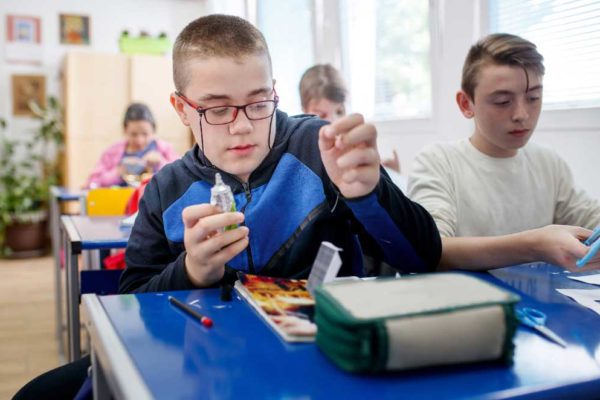Developments in SEND Education in Brighton & Hove

As parent carers you have first-hand experience of some of the issues facing SEND education in Brighton & Hove. Though we know the pace of change may not feel fast enough, there are significant developments taking place right now to improve the educational experience of our children and young people with special educational needs and disabilities.
We asked key people involved in addressing some of the challenges in SEND education to explain what’s happening and when.
Yvonne Ely at Brighton & Hove City Council gives details of all the elements of the council’s SEND Sufficiency Plan including new specialist places and provision, and Amanda Meier, Lead for the Change Programme, updates on their work around Ordinary Available Provision (OAP) and Alternative Provision (AP). John McKee, Head of Patcham High School gives the headteacher perspective on ongoing challenges, and the Parent Carers’ Council explains how they are working to help shape developments.
Amaze meets regularly and works with all these stakeholders, and we will continue to keep you up to date with changes and improvements as they happen.
Brighton & Hove City Council’s SEND Sufficiency Plan
The local authority is working on a SEND Sufficiency Plan for the city to guide the development of SEND provision. It will set out existing provision for SEND and forecast the need for future places, identifying gaps in provision. It will set out current projects and future plans for securing the additional places required. The plan will be monitored termly and updated to take account of progress and delivery.
In Year 1, 2025/26 school year priorities are:
- Further development of Inclusion Intervention Spaces in mainstream primary schools (see below)
- Development of autism resource bases at two primary schools to provide three primary bases across the city (see below)
- To provide a primary pupil referral unit (PRU) on the site of a mainstream primary school
- To provide more full-time places for pupils with social, emotional and mental health needs (SEMH)
In addition, in Year 1, the council will consider and plan for:
- Securing a third secondary school to develop an autism resource base in the centre of the city to provide three secondary bases in total, geographically spread.
- Developing specialist primary provision for neurodiverse children.
- Considering the development of KS1 nurture provision.
Click on the links below to read more about the Year 1 priorities of the SEND Sufficiency Plan.
Inclusion Intervention Space (IIS) Pilot
- Schools develop internal provision
- Managed by the school
- Small class setting
- Flexible provision to support wider SEND needs
- SEN support pupils and EHC plan pupils can access the IIS
- Staffed with a teacher and teaching assistant
- Space allocated within school
- Adapted and flexible curriculum
- Children spend part of their day in their mainstream class
This pilot initiative is being guided by Justine Harvey, Assistant Head of Inclusion at Hertford Primary School, and Clare Bradley, Deputy Principal Educational Psychologist, who are leading the schools’ community of practice. Each of the pilot schools has developed unique models for their intervention spaces tailored to their specific needs. Schools are actively collecting feedback and data as part of the ongoing evaluation process. The deadline for submission of evaluation reports is 23 June 2025.
If the evaluation shows a positive impact on children and young people, the aim is to gradually expand the intervention spaces across the city in the coming year. In Phase 2, the council proposes to introduce an additional six Inclusion Intervention Spaces, and will ensure a fair and equitable process for selecting the schools involved. The goal is to grow this model steadily each year. Brighton & Hove City Council will share the results of the evaluation and outline the next steps in July 2025.
Additional full-time places for pupils with social, emotional and mental health (SEMH) needs
New ASC Resourced provision
Additional places at The Hive, specialist autism provision
Hove Park Cullum Centre Key Stage 5 (Sixth Form)
The Change Programme Update
Since 2023, Brighton & Hove City Council has been participating in the Change Programme, along with East Sussex County Council and Portsmouth City Council. The Change Programme is a pilot project to test some elements of the government’s SEND Improvement Plan, published in March 2023. Read more about The Change Programme.
Brighton & Hove City Council is still awaiting confirmation and details of an extension to the Change Programme from the Department for Education (DfE). If it is extended, the local authority anticipates that it will involve testing initiatives relating to a ‘Local Inclusion Support Offer.’
Meanwhile, work that was started at the beginning of the current Change Programme test period continues:
SEND & Alternative Provision (AP) Partnership Board
Ordinarily Available Provision (OAP)
For information on the function of an OAP guidance document and how it might look, see Portsmouth’s OAP guidance, which is currently under review, and is widely considered to be a model document: Ordinarily Available Provision 2022
Review of Brighton & Hove City Council’s Behaviour and Attendance Panel
In autumn 2024, funding from the Change Programme was used to contract Olive Academies to conduct an independent review of the BAP. They engaged with a wide range of stakeholders and made several recommendations for change/development. Taking forward these recommendations, Amanda Meier (Change Programme Lead), Kate Barker (AP Development officer), Gavin Thomas (Access to Education Lead), Tracey Williams (Head of BHISS), and other BHISS partners are working on a three-phase model for change and improvement to the BAP process. This work will be overseen by the Wellbeing, SEND & AP workstream as part of the council’s Education Strategy.
Development of One Term Intervention model for the Pupil Referral Unit (PRU) - Tier 2 Alternative Provision
They have worked closely together to develop an intervention offer rather than a destination placement so that a greater number of young people can be supported by the specialist staff working within the PRU. The plan is for the children referred (via the BAP) for a short-term intervention placement will attend the appropriate PRU site for four days per week and return to their home school for one day a week. This is to support the council’s Principles of Belonging work and ensure that children are able to maintain relationships with staff at their home school. A pilot KS2 early intervention site will operate at Fairlight Primary School (opening in September 2025). The KS3/4 Early Intervention site will operate from Lynchet Close.
Adaptive Learning Provisions (ALPs) - Tier 2 Alternative Provision
Each ALP has capacity for nine students (three from host school and six referred from other secondary schools across the city). Like the PRU intervention offer, students attend the ALP for four days a week and return to their home school for one day a week. A further ALP has been agreed with Dorothy Stringer which will start to operate from September 2025. Discussions are also underway regarding a fourth ALP within another of the city’s secondary settings.
Kate Barker is currently completing an evaluation of the ALPs at Varndean and Patcham. Feedback from children, parents, and carers about their experience of the ALP provision is, so far, very positive. They are beginning to gather data on what the long-term impact of this provision is, particularly in relation to re-engagement with education, increased resilience, a reduction in the risk of exclusions and improvement in attendance.
Alternative Provision Specialist Taskforce (APST)
The team is led by Kate Barker (AP Development Officer) and comprises several specialist staff, including an educational psychologist, a speech & language therapist, a social worker, a youth worker, a BHISS SEMH practitioner, a Post-16 coordinator, youth engagement workers and an ASC language teacher. As the team’s first academic year of operating draws near, they are beginning to evaluate the impact of this team. Young people, parents and carers and other support agencies have given positive written and verbal feedback on the support provided and the difference this has made for improving outcomes, most especially around re-engagement with education. It is too early to provide statistical data to support this. They are now considering carefully, with all agency partners involved, how to create an APST model which is financially sustainable and develops into a wider reaching (outreach) support team so that mainstream settings can also access the excellent support offered by the APST.
Transitions – Early Years and into Post-16
Testing on the other reforms set out in the original SEND & AP Change programme has now ended. This includes:
- Standardised EHCP templates (the new template has now been adopted by Brighton & Hove)
- Standardised EHCP advice templates (the new template has now been adopted by Brighton & Hove)
- National and Local Inclusion Dashboards
- Multi Agency Panels
- Advisory Tailored Lists
- Strengthened Mediation
- National Standards
- Bands and Tariffs
- Local Area Inclusion Plan (LAIP)
Secondary school perspective – John McKee, Head of Patcham High School
“Across Brighton & Hove, schools are working with determination and care to meet the increasingly complex needs of children and young people with special educational needs and disabilities (SEND). While we face significant challenges, including rising demand, stretched resources, and delays in access to external services, we remain focused on doing all we can to provide the support our pupils need and deserve.
“We welcome the broader work underway from the local authority, including the OAIP, Alternative Provision reform, and SEND Sufficiency Planning. These initiatives have the potential to deliver meaningful improvements, and schools are keen to see how they will translate into clearer support pathways and more joined-up services.
“In the meantime, many schools are already trialling new approaches to inclusion, early intervention, and whole-school support. Pilots at Patcham and Varndean, for example, are helping to test models that could inform wider practice. And SEND reviews are giving schools a better understanding of where provision is working well, and where we need to strengthen what we do.
“Crucially, we know that none of this can succeed without strong, trusting relationships with families. We deeply value the insight, care, and advocacy that parents and carers bring. While there may sometimes be frustrations on all sides, it’s vital that we maintain a spirit of partnership, not opposition. By working together, we can navigate the challenges more constructively and make better decisions for our children. Our partnership with Amaze is an important part of that collaborative effort; helping to bridge communication, provide trusted advice, and ensure family voices are heard in shaping both practice and policy.
“We’re also incredibly proud of the dedication shown by school staff, who go above and beyond every day to adapt, support, and listen. Their commitment remains unwavering.
“Our shared goal is simple: to ensure every child feels understood, supported, and able to thrive. We may not have all the answers yet, but we’re committed to working together to get there.”
PaCC update on education
Brighton & Hove Parent Carers’ Council has been busy seeking to influence and help shape ongoing developments in education provision. Read about PaCC’s involvement in the SEND and AP Change Programme.
Amaze resources to support your child’s education
Online information:
- SEN support in school or college – Amaze Sussex
- EHC assessments and plans – Amaze Sussex
- Children not in school – Amaze Sussex
- Appeals and disputes – Amaze Sussex
Downloadable resources:
- In-depth guides – Amaze Sussex: detailed downloadable guides that break down what the law and legal guidance says about SEND and education, and give you step by step guidance on how to navigate the process.



